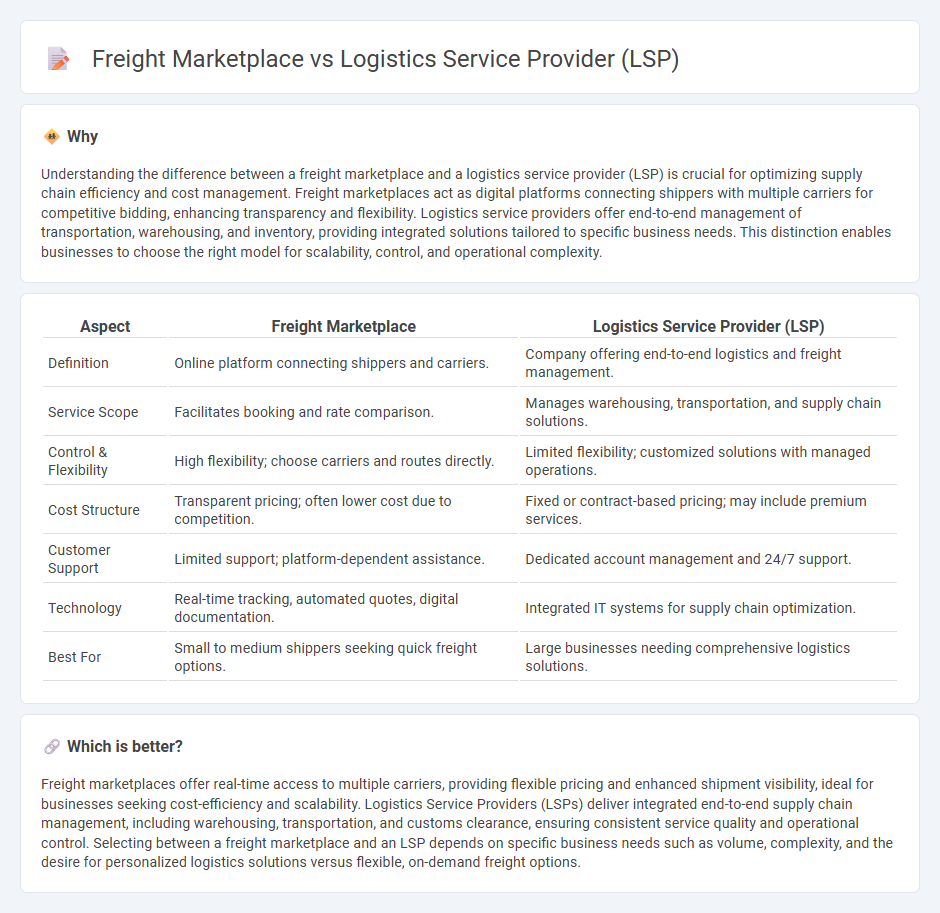
Freight marketplaces connect shippers with multiple carriers through digital platforms, enabling competitive pricing and real-time quoting, while logistics service providers (LSPs) offer comprehensive supply chain management, including transportation, warehousing, and inventory control. Freight marketplaces emphasize transparency and flexibility by aggregating numerous freight options, whereas LSPs focus on end-to-end logistics solutions tailored to specific business needs. Explore how these models optimize shipping efficiency and cost savings in today's supply chain landscape.
Why it is important
Understanding the difference between a freight marketplace and a logistics service provider (LSP) is crucial for optimizing supply chain efficiency and cost management. Freight marketplaces act as digital platforms connecting shippers with multiple carriers for competitive bidding, enhancing transparency and flexibility. Logistics service providers offer end-to-end management of transportation, warehousing, and inventory, providing integrated solutions tailored to specific business needs. This distinction enables businesses to choose the right model for scalability, control, and operational complexity.
Comparison Table
| Aspect | Freight Marketplace | Logistics Service Provider (LSP) |
|---|---|---|
| Definition | Online platform connecting shippers and carriers. | Company offering end-to-end logistics and freight management. |
| Service Scope | Facilitates booking and rate comparison. | Manages warehousing, transportation, and supply chain solutions. |
| Control & Flexibility | High flexibility; choose carriers and routes directly. | Limited flexibility; customized solutions with managed operations. |
| Cost Structure | Transparent pricing; often lower cost due to competition. | Fixed or contract-based pricing; may include premium services. |
| Customer Support | Limited support; platform-dependent assistance. | Dedicated account management and 24/7 support. |
| Technology | Real-time tracking, automated quotes, digital documentation. | Integrated IT systems for supply chain optimization. |
| Best For | Small to medium shippers seeking quick freight options. | Large businesses needing comprehensive logistics solutions. |
Which is better?
Freight marketplaces offer real-time access to multiple carriers, providing flexible pricing and enhanced shipment visibility, ideal for businesses seeking cost-efficiency and scalability. Logistics Service Providers (LSPs) deliver integrated end-to-end supply chain management, including warehousing, transportation, and customs clearance, ensuring consistent service quality and operational control. Selecting between a freight marketplace and an LSP depends on specific business needs such as volume, complexity, and the desire for personalized logistics solutions versus flexible, on-demand freight options.
Connection
Freight marketplaces streamline the connection between shippers and logistics service providers (LSPs) by offering real-time access to a broad network of LSPs, enabling efficient selection based on price, capacity, and service quality. These digital platforms enhance transparency and reduce operational costs by automating freight matching, tracking, and booking processes. Integration of freight marketplaces with LSPs' management systems optimizes route planning, load consolidation, and delivery performance, driving supply chain agility and scalability.
Key Terms
Asset-based vs. Non-asset-based
Asset-based logistics service providers (LSPs) own physical transportation assets such as trucks, warehouses, and equipment, enabling direct control over shipping and storage processes. Non-asset-based freight marketplaces operate as digital platforms connecting shippers with multiple carriers, offering flexibility and competitive pricing without owning transportation assets. Explore the key differences to determine the best logistics solution for your supply chain needs.
Contractual Relationship vs. On-demand Matching
Logistics service providers (LSPs) establish long-term contractual relationships with clients, offering dedicated services tailored to specific supply chain needs, while freight marketplaces operate on-demand, matching shippers with carriers dynamically based on immediate freight requirements. LSPs ensure consistent service quality and reliability through negotiated agreements, whereas freight marketplaces leverage technology-driven platforms for flexible, real-time capacity allocation without fixed commitments. Explore the distinctive advantages and strategic applications of LSPs versus freight marketplaces to optimize your logistics operations.
Value-added Services vs. Price-driven Transactions
Logistics service providers (LSPs) emphasize value-added services such as tailored supply chain management, real-time tracking, and integrated warehousing solutions to enhance operational efficiency and customer experience. Freight marketplaces prioritize price-driven transactions by connecting shippers and carriers through digital platforms that facilitate competitive bids and cost optimization. Explore deeper insights into how each model shapes the future of logistics.
Source and External Links
LSP vs 3PL: How Logistics Service Providers Differ - A logistics service provider (LSP) offers broad logistics services such as transportation, warehousing, packaging, and full supply chain management with customized, end-to-end solutions, differing from 3PLs that specialize in specific logistics functions and act as intermediaries.
Logistics service provider: What is it and how do you choose yours? - An LSP specializes in supply chain management services, optimizing logistics operations by leveraging expertise, tools, and partner networks to improve business efficiency and customer satisfaction across various supply chain stages.
Overview of Logistic Service Providers (LSPs) Management - Logistics service providers manage outsourced logistics operations like warehousing, inventory management, transportation, and freight forwarding on behalf of clients, who can outsource a portion or all logistics services to these third parties.
 dowidth.com
dowidth.com